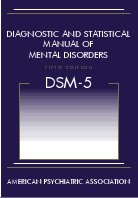Lesson 13: Alzheimer’s and Dementias
Attention

Two major changes are being proposed for the DSM-5 related to Alzheimer's and Dementia. First, they are proposing to drop the term "Dementia" in favor of "Major Neurocognitive Disorder". This changes is being proposed, in part, because of the stigmatizing use of the word "Dementia" and "Demented".
This is very similar to when the authors of the DSM dropped the terms "Idiot", "Imbecile", and "Moron". All of which used to be clinical terms used to describe degrees of mental retardation. In the DSM-5 the term retardation has been removed and replaced with intellectual disabilities.
Another significant change is that the term “dementia” has been eliminated and replaced with major or minor neurocognitive disorder. It was believed that the word dementia was stigmatizing toward older individuals and not well accepted by younger individuals with HIV dementia. The new term focuses on the decline from a previous level of functioning as opposed to a deficit.
The old dementia terminology required the presence of memory impairment for all of the dementias. It has been recognized that memory impairment is not the first domain to be affected in all of the other diseases that cause a neurocognitive disorder. For instance, in frontal temporal disorder, language could be affected first. This change in terminology will require that all diagnosing healthcare professionals first establish the presence of a neurocognitive disorder and then determine whether the neurocognitive disorder is minor or major.
Read the rest of the article regarding the changes in the DSM-5 and their relations to cognitive disorders:
Dementia and DSM-5: Changes, Cost, and Confusion By James Siberski, MS, CMC
Learning Outcomes
Upon completion of this lesson's material, students will be able to:
- Reflect on the similarities between stigma associated with Alzheimer's and other minor neurocognitive disorders and stigma associated with other mental illnesses
- Analyze viewpoints on the traditional medical model of Alzheimer's and alternative views
- Locate available research on various causes of minor neurocognitive disorders aside from Alzheimer's Disease
Teaching
Alzheimer's Disease
Click on the link below to visit the website of the Alzheimer's Disease International. Review the "World Alzheimer's Disease Report 2012 Executive Summary" and watch the video (both on the page when you click the link below. Very interesting information.
Alzheimer's Disease International Website
One of the most challenging aspects of this disease relates to how involved we try to make individuals in their own care (note in the video when the husband relates how important it is that people talk to his wife directly instead of always assuming they need to talk to him).
Issues of competence and ability to care for self are the pressing issues of Alzheimer's Disease patients and their families.
The subjective experience of Alzheimer's can be extremely frightening. Consider the "stages" that are discussed in the textbook:
- Recognition and concern: "Something is wrong."
- Denial: "Not me"
- Anger, Guilt, and Sadness: "Why me?"
- Coping: "To go on, I must do..."
- Maturation: "Living each day until I die"
- Separation from self
Perhaps the one we hear about the most is the "Separation from self". Individuals whom I have encountered who have had loved ones with this disease talk about the "personality" dying way before the body does.
Similar to other "mental illnesses" Alzheimer's has a significant degree of stigma associated with it. As is discussed in the video, right at the time when these individuals need others the most, they are more likely to be alone.
There are, however, other viewpoints. I'm going to have you investigate an interesting perspective that I came across called "They Myth of Alzheimer's" Now, don't be alarmed, this is not a viewpoint that says that people are "faking it" or that the symptoms are not real, it is a critical analysis of the etiology of Alzheimer's, our reluctance to diagnose it (thus doctors are not telling the truth all the time), and findings that indicate that the physiological changes that happen in the brain (plaques) are not directly connected to the symptoms of memory loss and confusion.
You be the judge...
The Myth of Alzheimer's
Feel free to explore this website!
Check out this film: "The Diseased Other"
This app is called the Alzheimer's Association Caregiver Buddy. Think through if you were working with a client who was the caregiver for an individual with Alzheimer's disease. The caregiver might be struggling with doing activities and communicating with their loved one. Look through this app to find some suggestions for providing information to your client about things he or she could do to improve their interactions.
The app is created and supported by the Greater Illinois Chapter of the Alzheimer's Association. I would expect the Live Help and 1-800 # resources would be connected to the services in Illinois. |
Minor Neurocognitive Disorders
In the second part of this lesson we see that there are a number of other conditions that can result in nonreversible dementias:
- Vascular Cognitive Impairment
- Dementia in Parkinson Disease
- Dementia with Lewy Bodies
- Frontotemporal Dementia
- Motor Neuron Disease
- HIV-Associated Neurocognitive Disorders
- Tauopathies
- Wernikie-Korsakoff Syndrome
Assessment
Possible Class Discussion
Reflect on the stigma associated with person's with Alzheimer's Disease. In what ways is this similar to the stigma that persons with other mental illnesses experience? Reflect on the video segment titled "The Diseased Other".
Lesson 13 Quiz
- Write a reflection paragraph contrasting the viewpoints of the current (medical model) views of Alzheimer's and those found in the "Myth of Alzheimer's". Be sure that you clearly identify the points of view in your contrast.
- EXTRA CREDIT QUESTION---Is there a connection between mental illness and increased risk for Alzheimer's or other minor neurocognitive disorders? Answering this question will double your score on this assignment. Be sure to cite the source of your information. This is an option question.
For this assignment I would like you to select ONE of the OTHER minor neurocognitive disorders (not Alzheimer's disease). Using the KVCC library resources to find two articles that discuss the disorder you select. For your document please include:
- Your name is at the top along with the name of the assignment
- A sentence indicating the topic you selected
- For each article you find cite the reference in APA format
- Post an electronic link to each of the articles into the document so that I can view it.
- After you have done this for both articles, write a one paragraph summary of what you have learned from these two articles.
This assignment should be no longer than a page.

